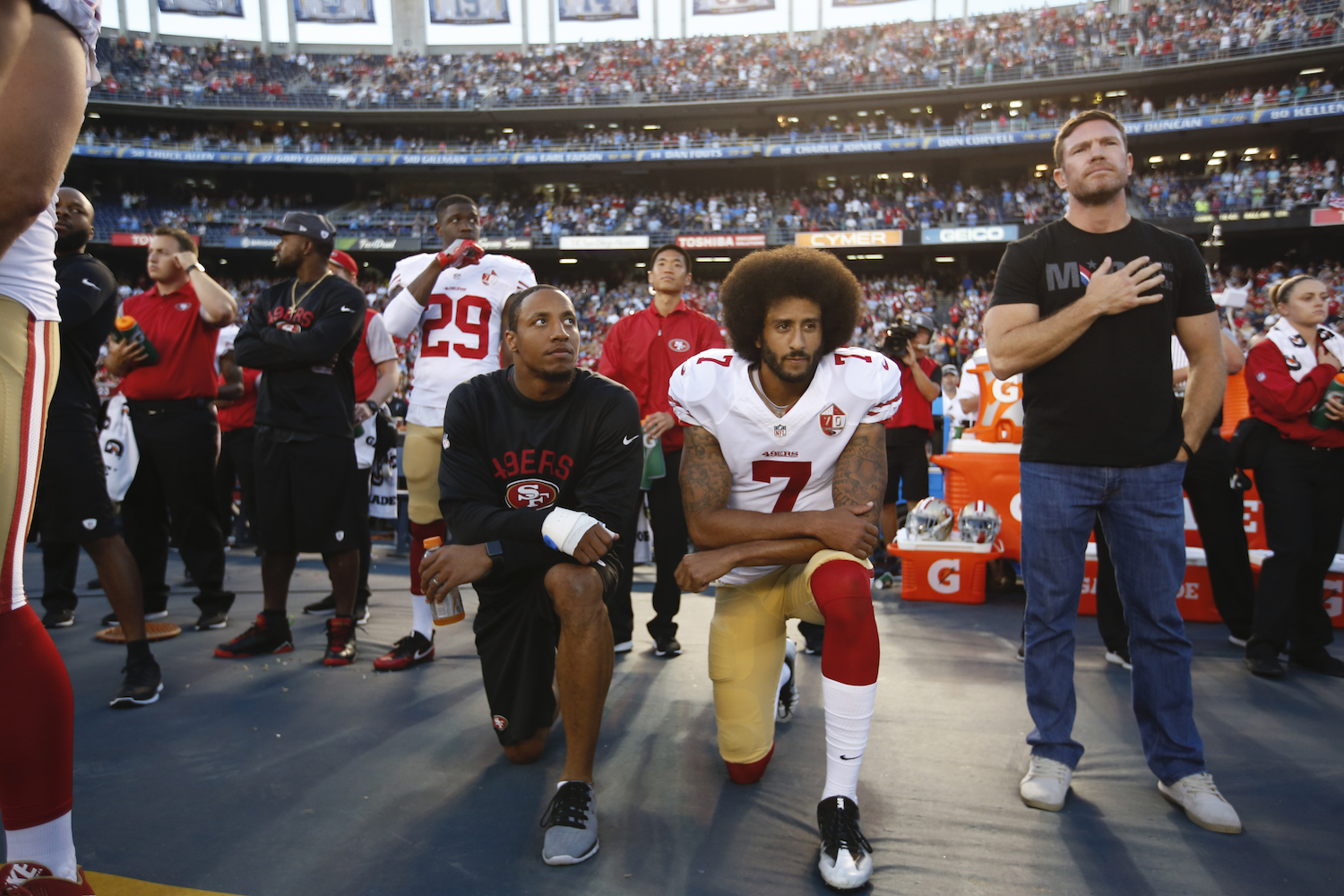NFL
Colin Kaepernick First Protested Police Brutality 4 Years Ago Today

Four years ago today, Colin Kaepernick first protested police brutality during the national anthem at a San Francisco 49ers preseason game. Most people don’t remember it didn’t start with him taking a knee. That came a week later. Since that time, a lot has changed including the position of NFL Commissioner Roger Goodell. Despite that progress, there’s a long way to go.
Colin Kaepernick’s first protest
RELATED: Colin Kaepernick Initially Protested Police Brutality by His Choice of Socks
Colin Kaepernick’s initial protest against police brutality went largely unnoticed. On August 26, 2016, during a preseason game against the Green Bay Packers, Kaepernick remained seated on the bench during the playing of the national anthem. Following the game, Kaepernick explained why he did it.
“I am not going to stand up to show pride in a flag for a country that oppresses Black people and people of color. To me, this is bigger than football, and it would be selfish on my part to look the other way. There are bodies in the street and people getting paid leave and getting away with murder.”
Kaepernick’s protest and words came just over a month after police shot and killed Alton Sterling in Louisiana. When asked about his decision following the game and whether or not he anticipated any consequences for his actions, the quarterback put it all in perspective.
“If they take football away, my endorsements from me. I know that I stood up for what is right.”
Colin Kaepernick meets with Green Beret and starts kneeling
RELATED: Colin Kaepernick Receives Apology from Past Vocal Critic of His Kneeling
Four days after Colin Kaepernick sat on the bench during the national anthem, former Green Beret and NFL player Nate Boyer wrote an op-ed for the Army Times expressing his thoughts on Kaepernick’s stance. Boyer ended his piece, saying he was listening with an open mind.
Kaepernick saw the letter, and three days later the two met in San Diego at the team’s hotel lobby before the 49ers matchup that night against the Chargers. During a more than hour-long conversation, both men discussed a variety of issues, including Kaepernick’s thoughts on police brutality and why he was protesting. Boyer talked about how sitting on the bench away from his teammates could be viewed as hurtful.
The two men agreed on a compromise. Kaepernick would take a knee beside his standing teammates. This would allow him to protest, and it would be respectful and unifying because he would still be part of his team.
“Taking a knee, honestly, is a sign of respect,” Boyer told Colin Cowherd in an interview. “People take a knee to pray. We would take a knee in front a fallen brother’s grave. I saw that image, while still getting his point across, much more respectful.”
The NFL’s changed position
RELATED: NFL Commissioner Roger Goodell Finally Apologizes to Colin Kaepernick in New Interview
When Colin Kaepernick initially protested, NFL Commissioner Roger Goodell said he didn’t “necessarily agree with what he is doing.” Goodell’s words were matched by the actions of NFL owners. Following the 2016 season, not a single team brought Kaepernick in for a tryout, much less signing him to a deal.
In late May 2020, with the brutal death of George Floyd at the hands of police and captured on camera, everything changed. As protests and demonstrations exploded in cities across America, police brutality became a big part of a larger national conversation on racial injustice. With that groundswell of support and acknowledging the problem exists, the eyes of many were opened, including Goodell. He said as much in a recent interview on Emmanuel Acho’s YouTube series Uncomfortable Conversations with a Black Man.
“The first thing I’d say is I wish we had listened earlier, Kaep, to what you were kneeling about and what you were trying to bring attention to,” Goodell admitted. “We had invited him in several times to have the conversation, to have the dialogue. I wish we would have had the benefit of that. We never did. You know, we would have benefitted from that. Absolutely.”
Despite the changing of hearts and minds, including that of Roger Goodell, the problem of police brutality is still as prevalent as ever, as evidenced by the shooting this week of Jacob Blake in Wisconsin. There’s no doubt Colin Kaepernick’s first protest four years ago has made a tremendous impact on our society. But as Blake’s shooting shows, there still remains much work to be done.











